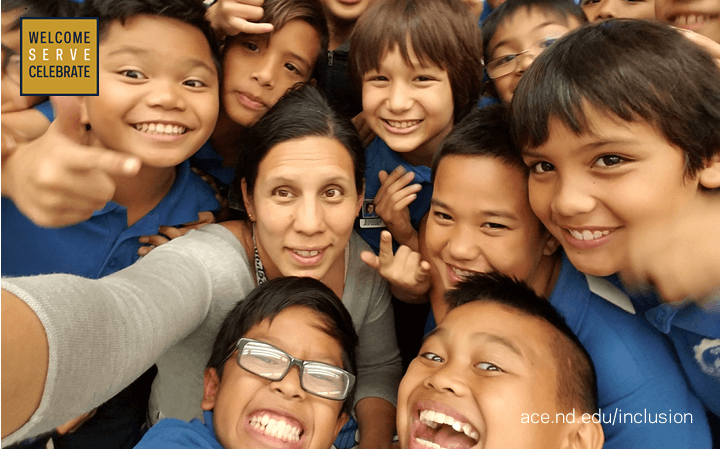The Program for Inclusive Education's (PIE) first cohort completed programming in July and embarked on their mission of inclusive education following an energizing two-week capstone experience on the campus of Notre Dame. It was a time of spiritual retreat, community unification, and comprehensive instruction after a year of online programming. The experience was filled with joyous convergence, passionate advocacy, and humble gratitude. Nacia Hatch lived this inaugural experience and was introduced in the August Blog. It is my privilege to share her thoughts following her journey with PIE. Many thanks for Nacia's guest authorship and all she is doing to welcome, serve, and celebrate all students!
~Christie Bonfiglio, Ph.D.; Director of the Program for Inclusive Education
This past year, I had the honor and opportunity to be a member of PIE's first cohort. My childhood dream of attending the University of Notre Dame could not have been fulfilled in a more transformative way. As a preface, I am prone to hyperbole and could write an entire series of blogs dedicated to extolling the virtues of PIE. And while I'm positive that totally unsponsored and free advertisement for the PIE program would please Dr. Bonfiglio, I am sure that I would be preaching to the choir. If you're reading this, you want to know more about PIE and why every Diocese and Catholic school in America should require all teachers to participate. However, please feel free to email me.
During the Program for Inclusive Education, our cohort was gently reminded that our call to be inclusive educators goes beyond our classroom walls. We were asked to lead our colleagues, schools, and dioceses to be more inclusive. When I left Notre Dame's campus, I was ready to kick some tires and light some fires in the name of inclusive education. By golly, I was going to lead my school to inclusion by hook or crook. However, during my frenzied preparation for my 11th school year, my motivation began to wane. In-service and faculty meetings have a way of deflating tires and dousing flames. The naysaying and resistance to change convinced me that perhaps I should begin my mission as a PIE completer by narrowing my focus and working on being the most inclusive, UDL/MTSS-using, data-collecting teacher I could be. As I write these words, I anticipate a multitude of heads vigorously nodding in agreement.
A quote by the 17th-century samurai and poet Masahide kept rattling around my head. "Barn's burnt down, now I can see the moon." This quote is so succinct and rich with meaning. It has multiple interpretations. My first interpretation was optimism–looking for the silver lining in the midst of crisis or tragedy. Hence, because I was not finding immediate success in bringing inclusive practices to my entire school, narrowing my focus and working on making changes in my classroom was the silver lining. Again, I was plagued with the thought of whether I was doing enough to bring inclusion to my school and diocese. This persistent thought led me to my second interpretation of Masahide's–decisive action. Sometimes you have to burn down the barn to see the moon. Now this is in sync with my leadership style. I was ready with the proverbial lighter fluid and matches for our next faculty meeting. I discussed my plan of attack with a colleague, and she asked me, "Do you really need to burn down the barn? Why can't you just look at the moon from the other side of the barn?" This was her gentle way of leading me to a third interpretation-removing obstacles. In other words, you don't have to literally burn down the barn to make a change. You could help people change their perspectives simply by taking a small step around the barn.
As we walk the path of inclusion with our Lord, we need to consider each interpretation. We will each be called to proceed with optimism, act decisively, or remove obstacles to change perspectives. Each one of these actions may be difficult for us, but in the words of Dr. Bonfiglio, "We can do hard things!" I urge you to remember Dr. Bonfiglio's words as you burn down your barns. I will be ready with the matches.
 Alliance for Catholic Education
Alliance for Catholic Education
